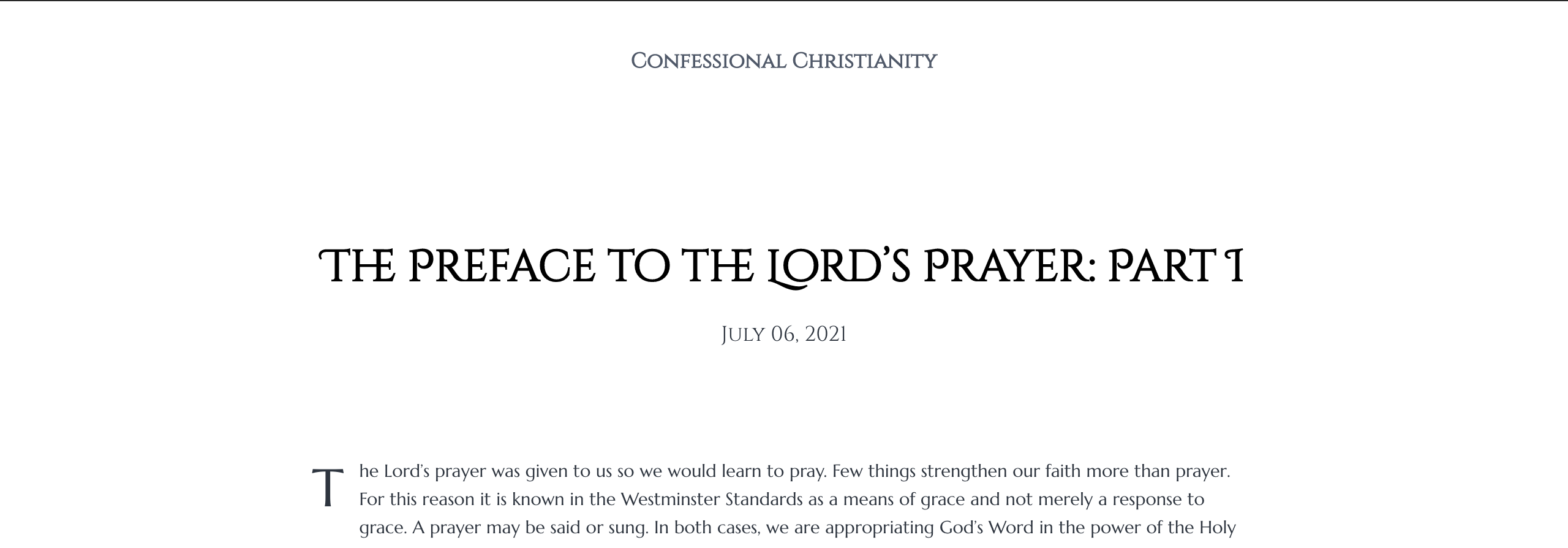The Lord’s prayer was given to us so we would learn to pray. Few things strengthen our faith more than prayer. For this reason it is known in the Westminster Standards as a means of grace and not merely a response to grace. A prayer may be said or sung. In both cases, we are appropriating God’s Word in the power of the Holy Spirit. The Spirit may appropriate the Word to us with our without prayer, but He often uses prayer. Whether our’s which we say in secret or those which are said in our hearing, on our behalf, or perhaps, most gloriously, in those prayers said for us in secret which we never hear. God may even answer prayers today which were said in generations past. God is saving his elect in our generation. Through prayer, it is often said, we take God’s promises to the bank. Through prayer, God’s Spirit intends to transmute his promises into bread for our souls.
For these reasons the Lord’s prayer is one of the most precious sections in all the pages of Scripture. We find here what our Lord would have us to pray, not merely verbatim, but in skeleton. We flesh out the direction our Lord gives to us with these words with our own apprehensions of his mercy, our own telling of his grace toward us, and even in our own telling and retelling of his grace toward others.
In the Westminster Larger Catechism, Question 189, we find an elaboration on the instruction we receive on how we ought to pray from the words “Our father, which art in heaven.” The first word “Our” instructs us that we ought to pray for and with others:
The preface of the Lord’s prayer (contained in thee words, Our Father which art in heaven,)[1] teacheth us, when we pray […] to pray with and for others.
WLC 189
Even when we pray alone, we are echoing the prayers of the saints who came before us. In this sense, we never pray alone. Moses captures this when he says in Psalm 90, verse 1:
Lord, you have been our dwelling place in all generations”
Psalm 90:1
Those who offer a prayer of mourning do so along with Job; those who offer a prayer of praise do so along with David; supremely, of course, in all our prayers we pray with Christ himself who experienced the entire range of human experience (without sin) as none before or since. Prayer is an activity which we do both in community and in secret but in a sense it is never done alone because it is always done through Christ. We pray with the knowledge that our brothers and sisters from the past, in the present, and into the future have prayed, are praying, or shall make the very same prayer as us! What unity we have in Jesus Christ?
Prayer is also an embodied and communal act. We may be joyful yet we offer prayers of mourning in unity with our brothers and sisters. This is for our comfort. Prayer is not just an act of individual expression. It is familial and communal act of love. In the hands of the Blessed Holy Spirit, the prayers of his people bring tremendous comfort. The prayer of a righteous man prevails much. Mountains of unbelief and sin have been moved through prayer! Think for a moment of how true this is in your own life and then multiply that by all the prayers of all God’s people throughout all time. Our God is “he who hears prayer” and his works are a marvel in our eyes.
What does this mean for our prayer lives? Brothers and sisters, it means we are not alone. Least of all in our prayers! God has sent forth his Son to save us from our sins and he has ransomed an innumerable body from every tribe, tongue, nation, and generation. When we pray, we are never alone. God hears. We suffer no unique trials, nor do we commit any unique sins. We are joined together in Christ and we join in unison to make prayer to our God. It is our hope and comfort that when we pray, we are never praying alone, but we are praying with and through the Lord Jesus Christ “who ever lives to make intercession for us”.


